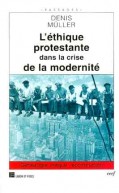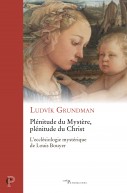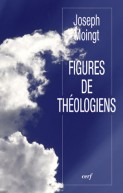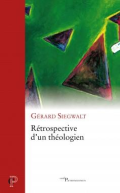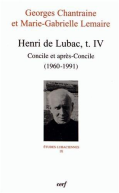Karl Barth
de Denis Müller
Collection Initiations aux théologiens
378 pages - oct. 2005
36,00€
Karl Barth (1886-1968) est sans nul doute l'un des géants de la théologie chrétienne du XXe siècle, toutes confessions confondues. À l'instar de ses plus prestigieux modèles – un saint Augustin, un Luther notamment –, c'est dans le corps à corps avec les Écritures saintes, singulièrement avec l'épître de Paul aux Romains, qu'il s'est forgé une conception originale de la pensée chrétienne et qu'il a bouleversé la situation religieuse et théologique de son temps. « Révolutionnaire » dans sa manière de vouloir congédier les théologies libérales du XIXe siècle et de contester en son principe toute forme de complicité du christianisme avec la monde profane ou même avec la modernité, le jeune Barth, celui des années 20, s'est peu à peu transformé en un imposant professeur de dogmatique et en un auteur universellement admiré, étudié, discuté, critiqué. Sa monumentale « Kirchliche Dogmatik », publiée de 1932 à 1968, inachevée, est devenue une référence, aussi bien à l'intérieur du protestantisme que pour le catholicisme romain, comme l'a montré son influence croissante sur des auteurs comme Balthasar, Bouillard et Küng et sur un certain nombre de Pères conciliaires à Vatican II. Le propos de cet ouvrage est de rompre avec les clichés et les idées reçues qui entourent la plupart du temps l'œuvre multiforme de Barth. Barth y apparaît en permanente recherche, ouvert aux enjeux de la culture et de la société civile, en dialogue critique, certes, mais également très réceptif avec les courants de la modernité et en prise avec l'actualité politique – contre la guerre en 1918, contre le nazisme en 1933-1945, contre la bombe atomique et l'impérialisme américain à la fin de sa vie. L'éthique – individuelle, mais aussi sociale et politique – joue une place centrale dans sa pensée, elle est loin de se réduire à un simple appendice de la dogmatique. Un survol très large de la réception internationale de Barth permet de mesurer l'écho intellectuel et œcuménique considérable de cette théologie en mouvement. Le choix de textes proposé à la fin de l'ouvrage mêle des passages devenus classiques à des aperçus dérangeants et détonnants de l'existence théologique, éthique, politique et culturelle de Barth.
--
Karl Barth (1886-1968) is without a doubt one of the giants of Christian theology in the 20th century, all confessions included. Like his celebrated models – Saint Augustine or Luther for example – he forged his original concept of Christian thought in a personal struggle with the Scriptures - particularly with Paul’s Epistles to the Romans - and dramatically changed the religious and theological situation of his times. “Revolutionary” in his manner of dismissing the liberal theologies of the 19th century and contesting the principle of all forms of complicity between Christianity and the profane or even modernity, the young Barth, in the 20s, gradually became an impressive professor of dogmatics and an author who was universally admired, studied, discussed and criticized. His monumental work “Kirchliche Dogmatik” (unfinished but published between 1932 – 1968) has become a reference within Protestantism as much as for Roman Catholicism, as shows his growing influence on authors such as Balthasar, Bouillard and Küng and a certain number of Fathers on the Vatican II council. The aim of this book is to break away from the clichés and preconceived ideas that so often surround Barth’s multi-faceted work. Barth is represented as a permanent researcher, open to culture and civil society, in critical dialogue of course but also highly receptive to currents of modernity and aware of political development: against the war in 1918, against Nazism from 1933-1945, against the atomic bomb and U.S. imperialism at the end of his life. Ethics – individual, but also social and political – play a central role in his thinking, which cannot be reduced to a simple extension of dogma. An overview of the international reception of Barth’s work enables us to measure the considerable intellectual and ecumenical echo of his theology in movement. The selection of texts at the end of the book includes passages that have become classics as well as some disturbing and explosive ones on Barth’s theological, ethical, political and cultural existence.
--
Karl Barth (1886-1968) is without a doubt one of the giants of Christian theology in the 20th century, all confessions included. Like his celebrated models – Saint Augustine or Luther for example – he forged his original concept of Christian thought in a personal struggle with the Scriptures - particularly with Paul’s Epistles to the Romans - and dramatically changed the religious and theological situation of his times. “Revolutionary” in his manner of dismissing the liberal theologies of the 19th century and contesting the principle of all forms of complicity between Christianity and the profane or even modernity, the young Barth, in the 20s, gradually became an impressive professor of dogmatics and an author who was universally admired, studied, discussed and criticized. His monumental work “Kirchliche Dogmatik” (unfinished but published between 1932 – 1968) has become a reference within Protestantism as much as for Roman Catholicism, as shows his growing influence on authors such as Balthasar, Bouillard and Küng and a certain number of Fathers on the Vatican II council. The aim of this book is to break away from the clichés and preconceived ideas that so often surround Barth’s multi-faceted work. Barth is represented as a permanent researcher, open to culture and civil society, in critical dialogue of course but also highly receptive to currents of modernity and aware of political development: against the war in 1918, against Nazism from 1933-1945, against the atomic bomb and U.S. imperialism at the end of his life. Ethics – individual, but also social and political – play a central role in his thinking, which cannot be reduced to a simple extension of dogma. An overview of the international reception of Barth’s work enables us to measure the considerable intellectual and ecumenical echo of his theology in movement. The selection of texts at the end of the book includes passages that have become classics as well as some disturbing and explosive ones on Barth’s theological, ethical, political and cultural existence.
- Dimensions : 135x215x24
- ISBN : 9782204079136
- Poids : 480 grammes
DU MÊME AUTEUR
> VOIR TOUS LES LIVRES DE l'AUTEUR
DANS LA CATÉGORIE THÈMES CONTEMPORAINS
« À l'image de Dieu ». Douceur et figure chez Paul Beauchamp
de Brigitte Picq
392 pages - avril 2016
Henri de Lubac, IV
Concile et après-Concile (1960-1991)
de Georges Chantraine ,Marie-Gabrielle Lemaire
838 pages - juin 2013




